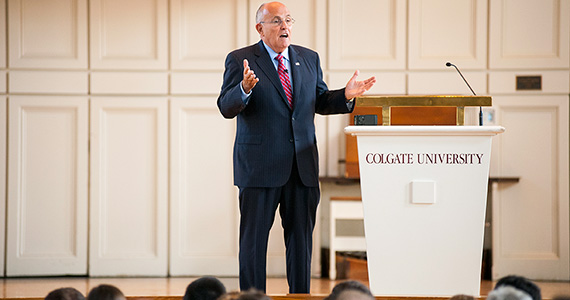
Rudy Giuliani speaks at Memorial Chapel. (Photo by Ashlee Eve ’14)
(Editor’s note: This post is by )
Rudy Giuliani, known as “America’s Mayor” for his leadership during and after the September 11 attacks, discussed the state of American politics and the need for resolute leadership in a lecture Monday at Memorial Chapel.
“A leader has to know what he or she wants to accomplish,” he stated. “You have to have strong beliefs.”
Giuliani did, however, acknowledge the difference between ideological leaders and practical leaders and stressed the importance of knowing when to compromise.
“When our principles meet resistance an effective leader finds a way to take a percentage of what he or she wants. In order for human beings to work together we have to compromise.”
Giuliani maintained that President Obama has not yet made that shift to practicality, but will be forced to compromise with Republicans in his last two years in office when Republicans will win the House and Senate.
The current polarization of the American body politic was a hot topic for Giuliani. He contended that the disagreement between Republicans and Democrats is the very nature of democracy. However, he talked about how the most extreme voters often exercise the most influence because they are the most energized to vote, especially in primaries.
In a lengthy question and answer session with students, Giuliani defended charter schools, the constitution, low taxes, and the mayoral capabilities of his successor, Michael Bloomberg.
asked for Giuliani’s thoughts on gun control.
Giuliani, a former federal prosecutor, took issue with a suggestion that gun control would have a big impact on crime. “It is behavior we have to deal with, not guns.”
Students asked questions about Giuliani’s support for building up the U.S. military. Throughout the talk Giuliani stressed a policy of peace through strength, both militarily and economically. “You prevent war by being so damn strong that nobody wants to go to war with you.”
In an appropriate last question, Patrick (P.J.) Benasillo ’17, a fellow New Yorker, asked Giuliani what September 11, 2001, was like for him. A respectful quiet filled the room as Giuliani responded.
“It was the worst day of my life and the best day of my life. I’ve never seen worse things and I’ve never seen such bravery.
“I knew people were looking at me. Therefore, their reaction would be determined by my reaction.”
Giuliani’s appearance, during which he also visited the village of Hamilton fire department and had dinner with students, was sponsored by The College Republicans, the , and the Budget Allocation Committee.
